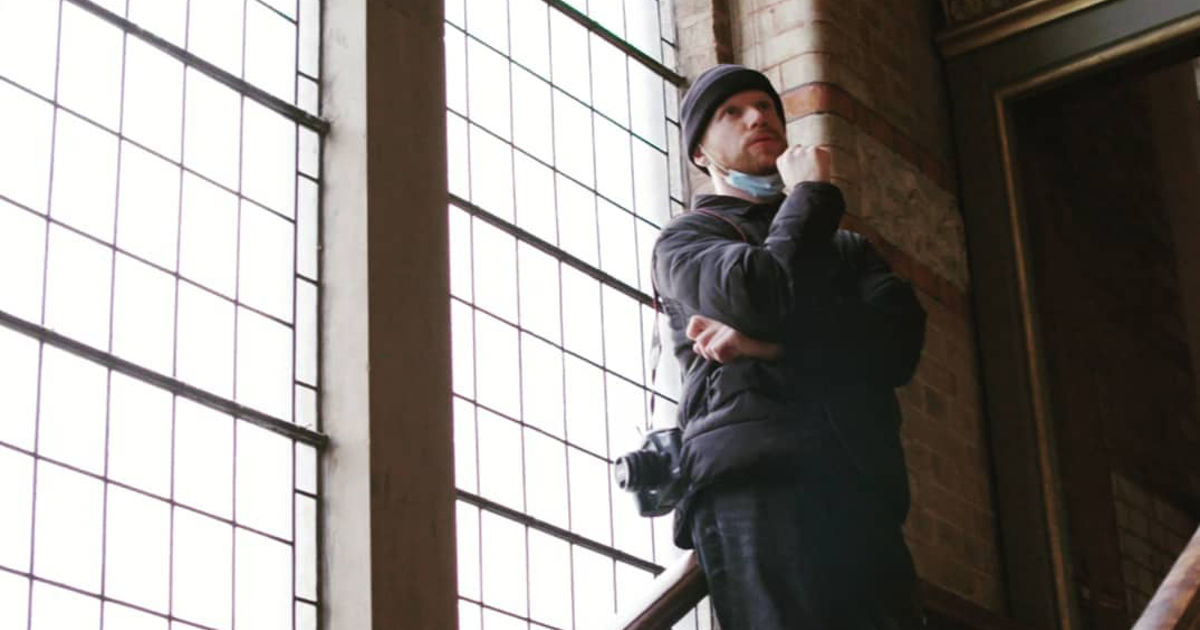)
shots Unsigned: Ricky Allen
For the latest catch up with unsigned directing talent we speak with Ricky Allen. Here he talks us through his music video The Dance You Sell for the band L'objectif. We also discuss early shoots on his Canon 5DM3, his favourite family films, and the highs and lows of shooting the promo.
This month we talk with director Ricky Allen about his music video for the band L'objectif.
Come on down to 'Be Honest Motors', because to move forwards, you gotta drive the past. This is the focus of The Dance You Sell a music video filmed with Blood Films, based loosely around Allen's mother, who is famous in his family for buying used cars which blow their engines in the first week... enter the world of shady car dealers!
Can you tell us a little about your background and your route into directing?
I grew up in a working-class household. Music and film was always prevalent in our home: Mum would constantly be writing music on her guitar and essentially playing gigs to me and my sisters and on Sundays, Dad would let me watch family favourites, such as Terminator, Big Boss and Predator. This was simultaneously captivating and terrifying with many a happy afternoon spent hiding behind the couch, fearful that I was next on Schwarzenegger’s list.
At 11 years old, I dropped out of school and became increasingly introverted at home and I think this is where a lot of my inspiration for filmmaking comes from. It wasn’t until University though, where I taught myself filmmaking and made a short film for my final project and from then on, I was hooked.
I shot my second short, Whatever the Weather, which featured live on the BBC and realised that maybe I wasn’t so bad at this directing thing. When my dad died, the finality of life became ever-present and filmmaking became my obsession.
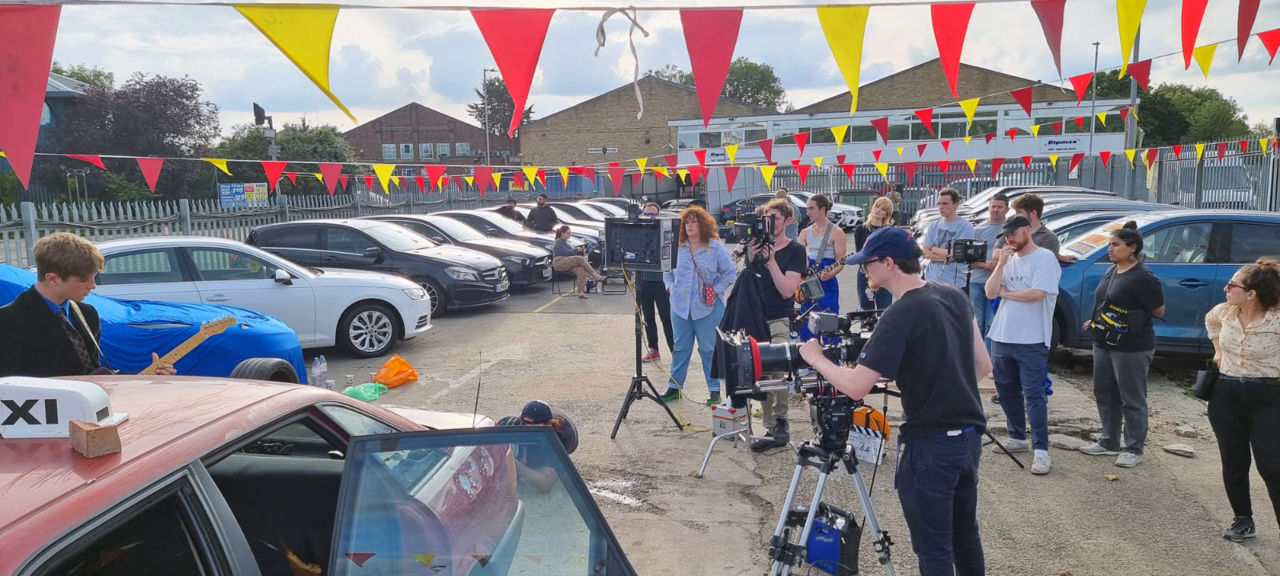
ABOVE: Behind the scenes on The Dance You Sell
Would you say you have a directing style? How did you arrive at it?
Reflecting on my past work, there’s definitely whispers of a style that at the time I was unaware of. One of my earliest music videos where that style become pronounced was about a young girl sneaking onto a Marks & Spencers food shoot, on the hunt for her beloved jam sandwich.
I spent a lot of time at home as a kid and a teenager, so the hum-drum aspects of home life became magnified for me and this has seeped into my work by magnifying the mundane aspect of life, using bold characters and bending reality ever so slightly. Shows such as Spaced, Garth Marenghi’s Darkplace and Father Ted, all had a huge impact on an insular teenager looking for comic relief.
Did you study filmmaking? How did you learn your craft?
On my last year of studying Creative Music Technology at Bath Spa University, there was a lot of creative freedom given by our tutors and for my final project, I decided to make a short about my dad’s alcoholism. It wasn’t until a few years later, that I made another short film about a young skateboarder around the city of Bristol, which got me noticed and I was suddenly live on BBC news talking about it. From then on, I just started making a bunch of films, running around like mad man with a Canon 5DM3.
I just started making a bunch of films, running around like mad man with a Canon 5DM3.
Fast forward a few years and I landed an in-house director role at Sony Music’s 4th Floor Creative. While there, I learned about every part of production from the creative process, producing, editing, etiquette between artist, management and labels to shooting on-set and post-production.
During my period there, I enrolled on the National Film & Television School’s ‘Directing Commercials’ course which is lead by Stuart Harris, who has some of the best stories from his days as a DP. The school really helped me hone my style.
Credits
powered by
-
- Production Company Blood Films
- Director Ricky Allen
-
-
Unlock full credits and more with a Source + shots membership.
Credits
powered by
- Production Company Blood Films
- Director Ricky Allen
- DP Toby Lloyd
- Producer Conor Duffy
- Creative Director Chris Kirtley
- Production Designer Nivitha Muralikrishna
- Colorist Mara Ciorba
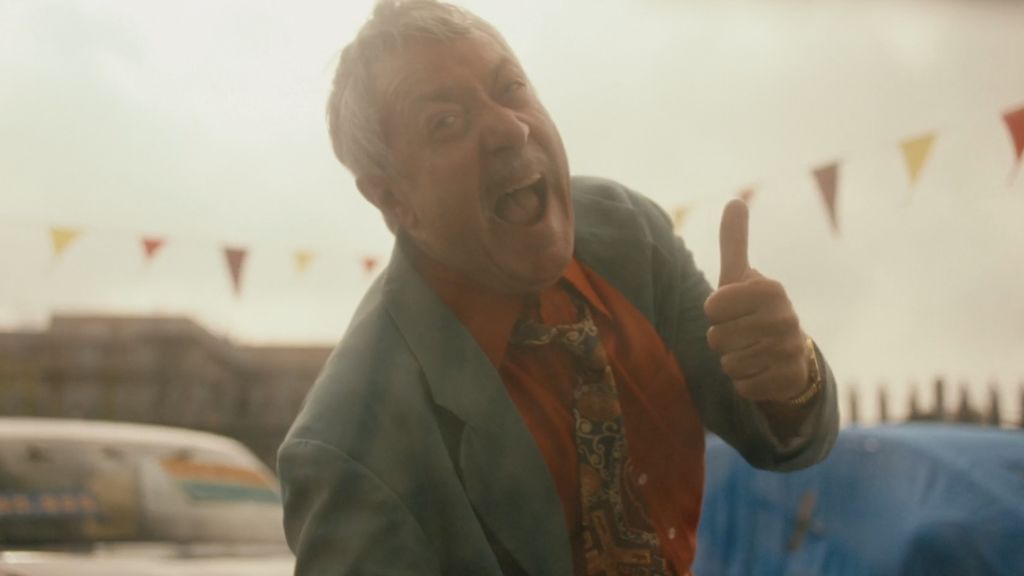
Credits
powered by
- Production Company Blood Films
- Director Ricky Allen
- DP Toby Lloyd
- Producer Conor Duffy
- Creative Director Chris Kirtley
- Production Designer Nivitha Muralikrishna
- Colorist Mara Ciorba
What was the inspiration for The Dance You Sell?
The artist conveyed a message of longing for a past time, even though he knew that period wasn’t good for him. I feel as humans, we tend to romanticise the past to an unhealthy degree and it made me think of my mum, who is famous in our family for buying used cars which blow their engines in the first week.
I started to think of shady used car dealers, who deal in essentially peddling the past at the expense of unsuspecting buyers and this train of thought led to funny scenarios of an intern attempting to sell a car that has long passed its sell by date.
What other directors' work do you admire?
Frank Budgen was an exceptionally talented director who excelled in a variety of genres, such as comedy, drama and commercials that featured elaborate special effects. His Double Life film is a true masterpiece, with its use of famous painting-inspired compositions, the shared monologue and a memorable finale in which a hooded child claims to have conquered worlds. You really do believe him. This commercial is a testament to the height of Budgen's directing talent, and a source of inspiration for me as an artist.
More contemporary directors I admire are Dylan Williams Holmes who has a wonderful sense of humour and comedic timing, his promos for Artificial Pleasure All I Got and Banfi’s Never Really Cared showed me there’s still a place for comedy in music videos.
Others, who I love are Noah Lee, Matilda Finn, Frank Lebon, Charlotte Regan, Eoin Glaister, Georgia Hudson and Vania Heymann.
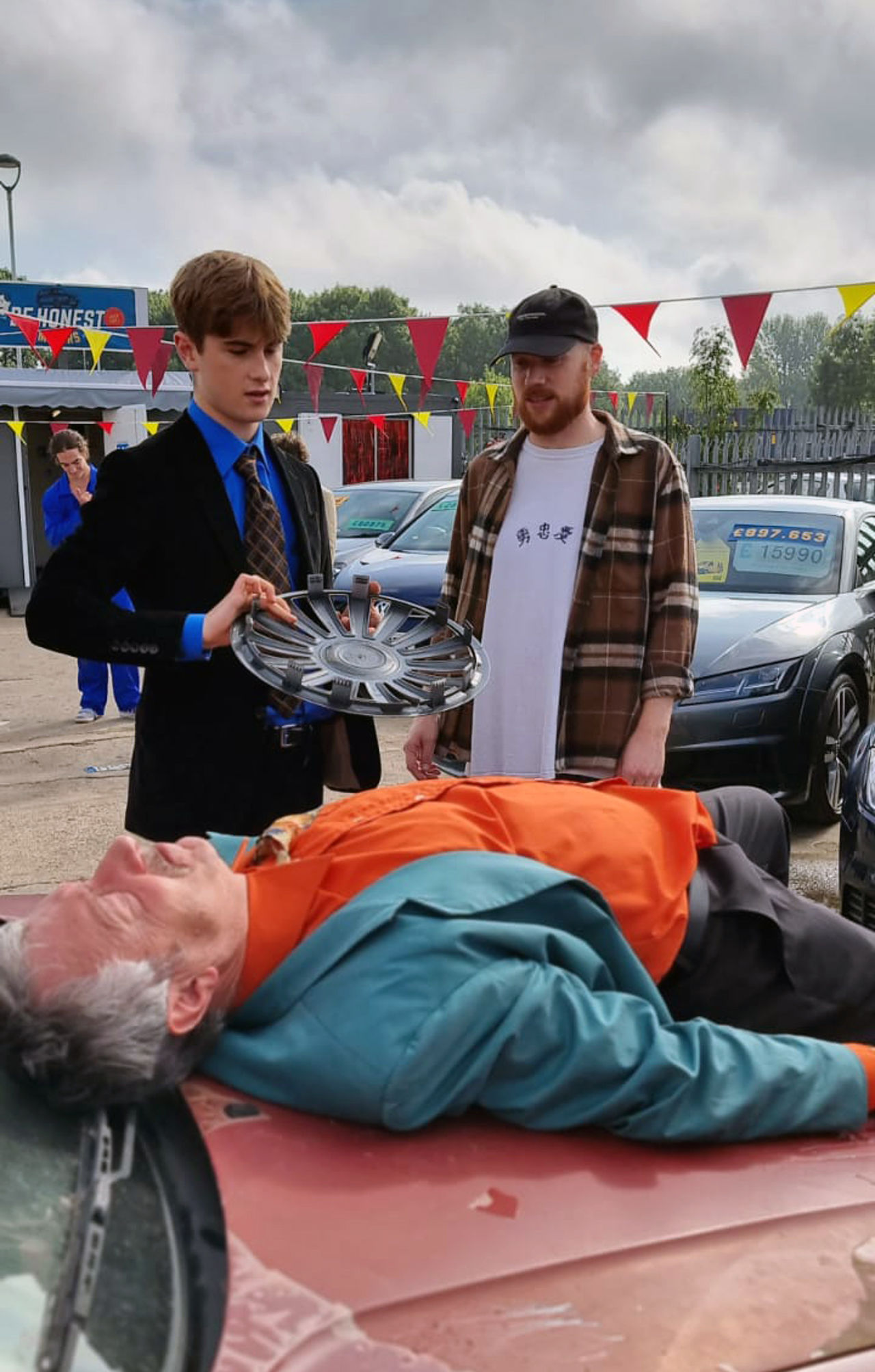
ABOVE: Ricky on set
Where do you find the inspiration for your projects?
In my current approach to music videos, I am particularly drawn to the idea of creating a world based on a single picture or painting. I often browse through my collection of photography and art books, searching for images that evoke a response.
This technique was used for a recent music video, where I drew inspiration from a photography book by Jason Eskenazi that contained surrealist and dream-like Soviet photographs. One particular photo, featuring cadet trumpet players and a floating cosmonaut in a film studio setting sparked the concept for the video. I find it incredibly captivating to bring a still photograph to life.
What were the biggest challenges you faced in pulling this project together?
The location was a headache for all of us especially for the producers, Conor Duffy and Matthew Rhys, it’s hard to persuade any business at the best of times to close for a day, but when the budget is tight, it feels neigh on impossible.
We must of contacted every used car lot in London and there was even a point of looking at junk yards to see if we could shoe horn in that as a used car lot. We persevered and through the brilliance of the production company Blood Films we found a place in Hertfordshire that was up for it, after some bargaining.
Another challenge was making the car lot look anything but grey. And you know, when you’ve not got a lot to play with, you quickly realise how talented the people around you are when they can muster something out of, well, not much. For that, I have to thank Nivitha Muralikrishna, who came on as the PD and worked wonders bringing life into a car lot.
How long was the shoot and what was the most challenging aspect of the project?
Shooting a narrative-led music video in just one day is always a challenging task. In order to effectively tell the story, there are usually a significant number of beats that need to be captured, typically around forty shots, is my preference, which often earns me an intense stare from the 1st AD. So, the challenge is always to shoot efficiently without sacrificing quality.
As I build the shot list, I’m constantly thinking: how can I keep these shots unique whilst ticking off various narrative beats from this one setup. The relationship between me and DP, Toby Lloyd, was magnificent and he really understood the need to shoot efficiently whilst maintaining quality.
What have you learned during the process of making the film?
The importance of trust and happiness among the talent and crew during the creative process cannot be overstated, although it may seem obvious, I feel it can be often overlooked. Maintaining a calm demeanour and not allowing the pressure to externalise is important to ensure a positive atmosphere on set, especially in low-budget productions where everyone must have faith in the vision and be willing to go to that extra mile, if necessary.
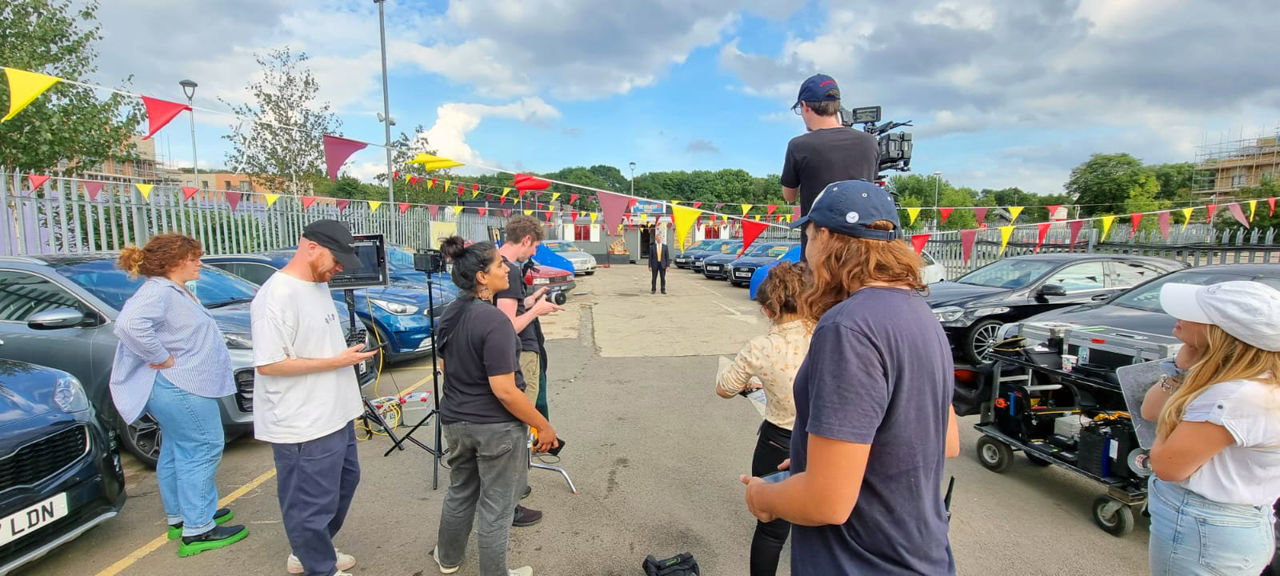
ABOVE: Behind the scenes on The Dance You Sell
What are your hopes and plans for the future?
My future plans involve honing my storytelling skills and doing bigger and better work. I have been collaborating with a creative producer, Lindsay Fraser, and together we secured funding from Manchester company, Doodledo, for my short film The Wolf at the Door.
This film delves into the childhood trauma that stems from bailiffs visiting family homes, which causes lasting anxiety and often guilt for the children thrust into these stressful adult situations. We hope to raise some additional funds and plan to shoot in a couple of months.
Looking further into the future, I aspire to make meaningful and humorous commercials, alongside impactful shorts and eventually a feature film. While I’m at it maybe I’ll throw in a novel for good measure.
)


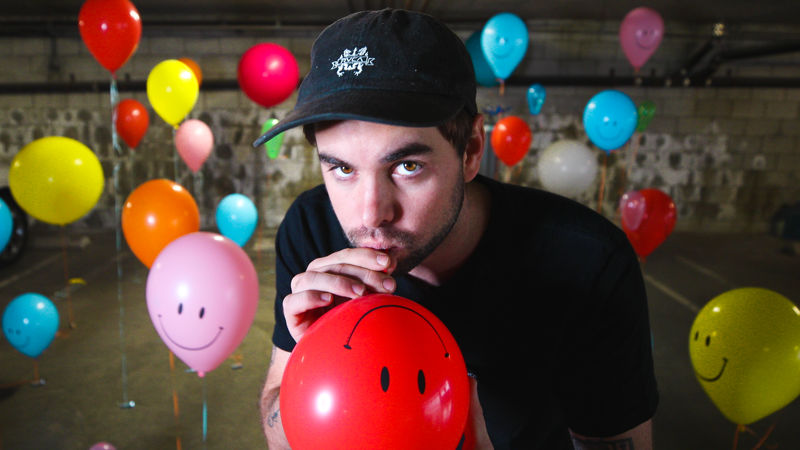


 + membership
+ membership






